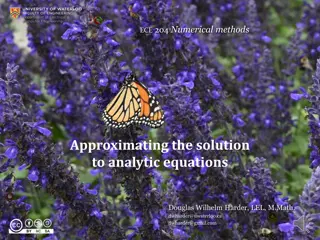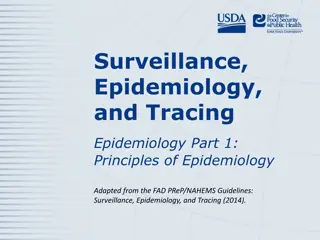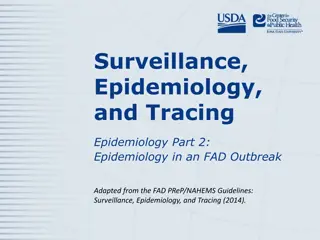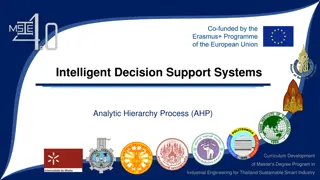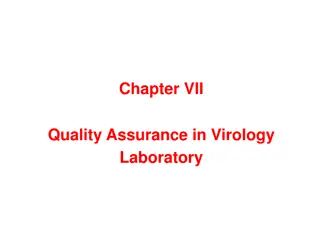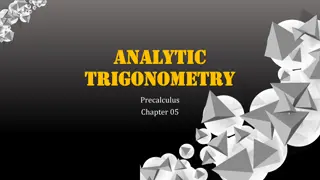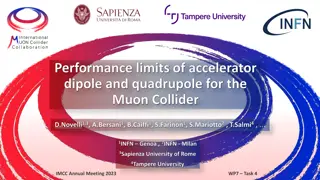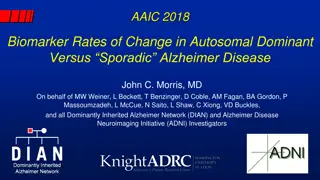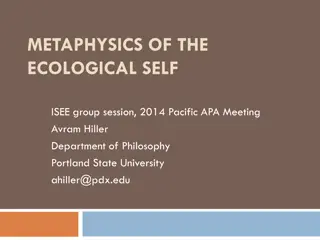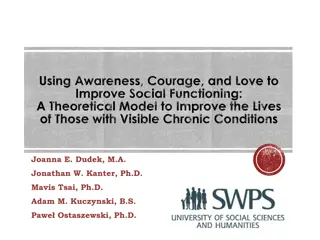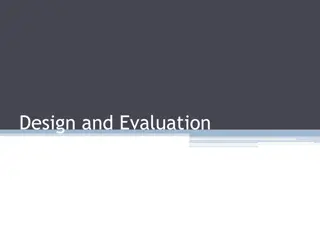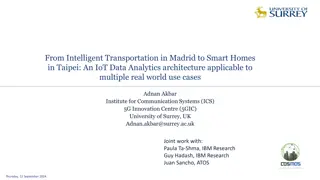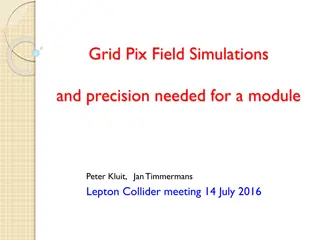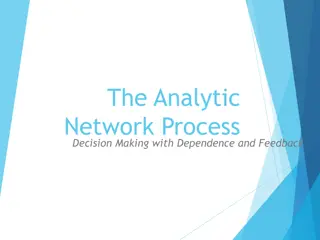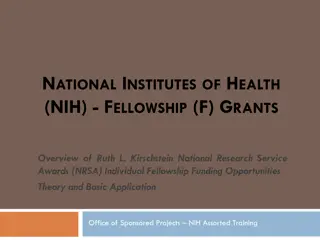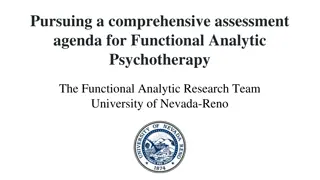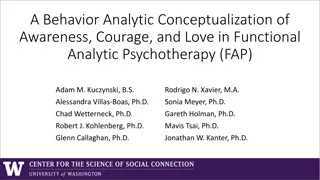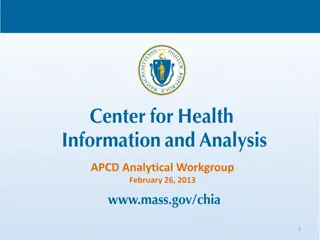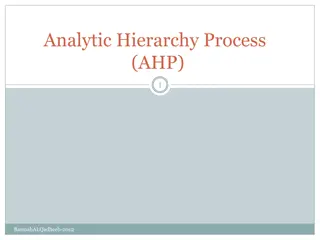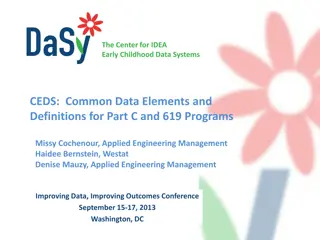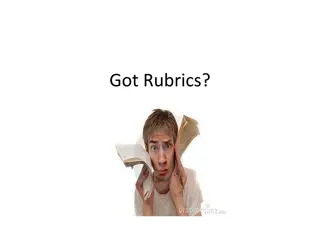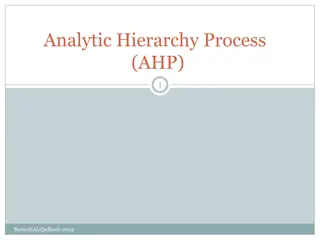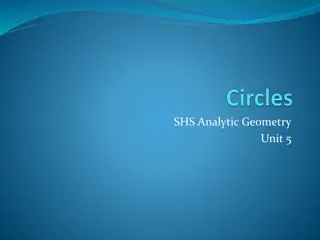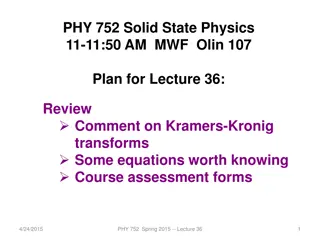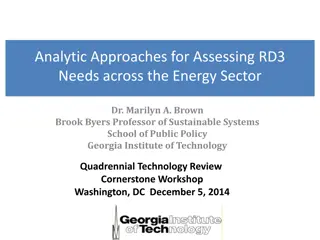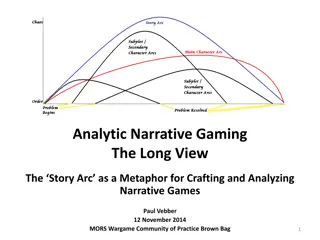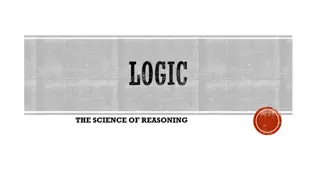Elicitation techniques
An outline of the requirements engineer's non-technical skills, including analytic thinking, empathy, communication skills, conflict resolution skills, and moderation skills.
3 views • 35 slides
Overview of Research Process and Quantitative Research Phases
The research process involves steps like identifying, locating, assessing, and analyzing the research question to find answers. It includes quantitative and qualitative approaches, with specific phases like conceptual, design, empirical, analytic, and disseminating phases in quantitative research. E
9 views • 27 slides
Numerical Methods for Approximating Analytic Equations
Introduction to approximating solutions to analytic equations, focusing on differential equations, integral equations, and integro-differential equations. Exploring ordinary and partial derivatives, differential and integral equations, and the involvement of unknown functions and their derivatives a
4 views • 15 slides
Principles of Epidemiology: Understanding Disease Occurrence and Surveillance
Epidemiology is the study of disease patterns, factors influencing disease occurrence, and the core functions of surveillance, field investigation, and analytic studies. It involves understanding disease characteristics, natural history, and evaluating the effectiveness of activities to mitigate dis
1 views • 25 slides
Epidemiology Investigation and Response in FAD Outbreaks
This presentation covers the phases of epidemiological investigation in Foreign Animal Disease (FAD) outbreaks, including the descriptive, analytic, and intervention phases. It discusses the collection of information, diagnostic testing, disease risk factors, associations, and identifying the FAD ag
1 views • 14 slides
Analytic Hierarchy Process (AHP) for Sustainable Smart Industry Curriculum Development
Intelligent Decision Support Systems and the Analytic Hierarchy Process (AHP) play a crucial role in the development of a Master's Degree Program in Industrial Engineering for Thailand's Sustainable Smart Industry. AHP, developed by Thomas Saaty, aids in measuring intangible factors through paired c
0 views • 23 slides
Quality Assurance in Virology Laboratory
This chapter focuses on quality assurance in virology laboratory, covering topics such as quality control, documentation of test results, laboratory safety rules, and more. It explains the types of quality control, quality assurance cycle, and process areas of quality assurance in laboratory testing
4 views • 19 slides
Comprehensive Slideshow for Precalculus with Analytic and Trigonometry Concepts
In this slideshow accompanying the Precalculus textbook by Richard Wright, diverse topics such as Analytic, Trigonometry, and Precalculus Chapter 05 are discussed with examples and diagrams from the book. The content is designed to assist learners in gaining a better understanding of key mathematica
1 views • 53 slides
Analytic Versus Continental Philosophy in the 20th Century: A Comparative Overview
In 20th-century philosophy, the divide between Analytic and Continental schools deepened but has seen recent attempts at reconciliation. Analytic philosophy emphasizes logic, language, and epistemology, requiring technical expertise, while Continental philosophy rejects metaphysical speculation and
2 views • 15 slides
Performance Limits of Accelerator Dipole and Quadrupole for Muon Collider
Utilizing Python code, the study analyzes the limits of accelerator dipole and quadrupole for the Muon Collider. Analytic formulas are implemented to assess the behavior of these components based on critical current density, operating temperatures, and superconductor materials. The study explores li
0 views • 17 slides
Assistant Professor Divya R. - Complex Analysis and Probability Course Overview
Assistant Professor Divya R. from the Department of Mathematics at K.S. School of Engineering and Management in Bengaluru presents a course on Complex Analysis and Probability. The course covers topics such as functions of complex variables, Cauchy-Riemann equations, properties of analytic functions
0 views • 27 slides
Biomarker Rates of Change in Autosomal Dominant vs. Sporadic Alzheimer Disease
Autosomal Dominant Alzheimer Disease (ADAD) and Sporadic Late Onset Alzheimer Disease (LOAD) show distinct clinical presentations, neuropathological features, and rates of progression. The DIAN-ADNI Comparison Study aims to investigate if ADAD and LOAD share the same pathophysiology and how they res
0 views • 16 slides
Metaphysics of the Ecological Self and Monism in Philosophy
The discussion explores the concept of the ecological self in deep ecology and the interplay with contemporary analytic philosophies like monism. It proposes a moderate view that acknowledges internal dependence relations between humans and the environment, grounding normative claims about human-env
2 views • 29 slides
Unpacking Problem-Driven Political Economy Analysis at The World Bank
Explore the benefits and challenges of problem-driven political economy analysis based on The World Bank's experience. This approach focuses on specific issues to generate actionable recommendations, aligning with the Bank's broad sectoral engagement and investment in analytic work. The problem-driv
0 views • 17 slides
Comprehensive Approach to Enhancing Social Functioning in Visible Chronic Conditions
This theoretical model explores the impact of visible chronic differences (VCDs) on individuals, emphasizing stigmatization and societal norms. It discusses the importance of social connection, highlights risks associated with VCDs, and presents the benefits of Functional Analytic Psychotherapy (FAP
0 views • 23 slides
Design and Evaluation in Visualization Techniques
Understanding the importance of formal evaluations in visualization techniques, this material covers a range of evaluation methods including empirical and analytic approaches such as usability tests, controlled experiments, and expert reviews. It delves into the scientific method of hypothesis forma
1 views • 41 slides
IoT Data Analytics Architecture for Real-World Use Cases
Explore the IoT data analytics architecture proposed by Adnan Akbar from the University of Surrey, applicable to diverse real-world scenarios like smart homes in Taipei. Discover how IoT leverages the connection of everyday objects to the internet, enabling remote control of physical environments. D
1 views • 22 slides
Evocative Objects in Educational Research: A Reflective Paradigm
Delve into the role of evocative objects in educational research through a reflective practice approach, exploring generative and divergent analysis models, and considering alternative quality criteria. The creative analytic paradigm emphasizes the serendipitous nature of engaging with objects for a
0 views • 21 slides
Grid Pix Field Simulations: Precision Study for Module Design
Aimed at simulating various grid pix designs for a module, focusing on edge effects and E field deformations. The simulations use analytic expressions for E field in rectangular plates, with emphasis on studying the E field design and required mechanical-electrical precision for reducing deformation
0 views • 19 slides
CO2-Laser-Driven Dielectric Laser Accelerator Proposal
Study and experimental demonstration of a CO2-laser-driven dielectric laser accelerator, addressing the limitations of current accelerator technologies by utilizing longer laser wavelengths for increased charge and improved beam control. The proposal aims to develop a novel in-vacuo scheme for ultra
3 views • 13 slides
Analytic Methods in General Business Research Presentation
This presentation covers the background, specific aims, methods, theoretical model, results, discussion questions, and limitations of a research analysis in the field of general business. Key elements such as research questions, hypotheses, cohort characteristics, data analysis plan, theoretical rel
0 views • 8 slides
Microsoft Fabric Training | Microsoft Azure Fabric Training
\nMicrosoft Fabric Training- Visualpath provides the best Microsoft Fabric Online Training globally. Learning Our Microsoft Azure Fabric Training will help you to understand the components of Microsoft Fabric, such as Power BI, Azure Synapse Analytic
0 views • 11 slides
Analytic Network Process: Decision Making and Feedback
Explore the Analytic Network Process for decision-making with dependence and feedback. Compare hierarchical and network models, prioritize criteria in AHP and ANP, establish car priorities based on criteria, and employ feedback to link alternatives to criteria for preference. Make pairwise compariso
1 views • 19 slides
NIH Fellowship Grants Overview: Funding Opportunities for Research Training
The NIH Fellowship Grant series provides support for graduate students and postdoctoral researchers to advance their research skills and change career directions. The program offers various funding mechanisms and aims to enhance research design, methods, and analytic techniques through mentored rese
0 views • 47 slides
Comprehensive Assessment Agenda for Functional Analytic Psychotherapy
Pursuing a comprehensive assessment agenda in Functional Analytic Psychotherapy involves psychometric measurement of interactions in and out of session. The research team at the University of Nevada-Reno discusses the goals, challenges, and tools essential for behavior therapists and researchers, ai
0 views • 25 slides
Functional Analytic Psychotherapy (FAP) Concepts
Delve into the Behavior Analytic Conceptualization of Awareness, Courage, and Love in Functional Analytic Psychotherapy (FAP). Explore the principles of FAP, including clinically relevant behaviors, the therapeutic relationship, and the five rules guiding the practice. Discover how FAP targets behav
0 views • 21 slides
Insights into APCD Analytic Webinars and Projects
This content provides a comprehensive overview of the APCD Analytic Webinar held on February 26, 2013. It includes the objectives of the webinar, agenda highlights, participant statistics, current projects utilizing APCD data, and a summary of approved applications to date. The information covers a
0 views • 23 slides
Analytic Hierarchy Process (AHP) in Decision Making
Analytic Hierarchy Process (AHP) is a method developed by Prof. Thomas L. Saaty for deriving ratio scales from paired comparisons. It involves levels of analysis starting from the goal to alternative choices, considering both objective measurements and subjective opinions. Pair-wise comparisons are
2 views • 19 slides
Developing Common Data Systems for Early Childhood Programs
Explore the benefits and challenges of establishing data systems for Part C and 619 programs using common data elements and definitions. Learn about the Align and Connect tools developed by the CEDS initiative for shared data dictionaries and analytic strategies. Discover the significance of Common
0 views • 46 slides
Mastering Rubrics: Types, Design, and Application
Understand the essentials of rubrics by exploring various types like checklists, rating scales, Likert-type scales, holistic, and analytic rubrics. Learn about the characteristics of good rubrics and how to create effective scoring guides. Get insights from examples like the University of Pittsburgh
0 views • 9 slides
Analytic Hierarchy Process (AHP) for Decision Making
Analytic Hierarchy Process (AHP) is a decision-making method developed by Prof. Thomas L. Saaty for handling multi-criteria problems in business environments. It involves creating ratio scales from paired comparisons to prioritize goals, criteria, and alternatives based on subjective opinions and ac
1 views • 19 slides
Circles in Analytic Geometry
Explore the fundamentals of circles in analytic geometry by learning how to derive circle formulas, equation determination, completing the square, proving circle properties, and solving application problems. Discover the definition of a circle, its relation to triangles, and the terms, equations, an
0 views • 51 slides
Multipolar Expansion of Magnetic Field and Field Harmonics in Physics
This content delves into the concepts of field harmonics, Maxwell equations for magnetic field, complex numbers, and analytic functions in the context of magnetic field measurements. It explores the mathematical intricacies involved in understanding magnetic fields and the applications of these theo
0 views • 46 slides
Analytic Hierarchy Process for Decision Modeling
Dive into the Analytic Hierarchy Process (AHP) developed by Thomas L. Saaty in the 1970s. Explore how AHP aids in complex decision-making processes with multiple criteria. Learn about modeling problems as hierarchies, conducting pairwise comparisons, deriving weight coefficients, and evaluating prio
0 views • 27 slides
Review of Analytic Properties of Dielectric Function in Solid State Physics
The lecture covers the analytic properties of the dielectric function, focusing on Kramers-Kronig transforms. Key equations and the practical evaluation of relations are discussed. Numerical methods for singular integrals and the use of Mathematica for Kramers-Kronig transforms are highlighted.
0 views • 18 slides
Analytic Approaches for Assessing RD3 Needs in Energy Sector
This insightful content explores various analytic approaches for assessing RD3 needs in the energy sector, presented by Dr. Marilyn A. Brown. The methods discussed include scenario analysis, expert elicitation, games and prediction markets, technology roadmapping, and more. These approaches delve in
0 views • 12 slides
Integrating BMS into Cloud Analytic Platform with Haxall
Overcome the challenges of integrating Building Management Systems (BMS) into a cloud analytic platform using Haxall solutions. Explore issues with data granularity, intervals, transformation, and more. Enhance capabilities with the Haxall Framework.
0 views • 23 slides
Understanding Representative Timelines in Analytic Methods
Representative timelines are an effective analytic method that merges individual timelines to foster empathy and protect privacy. This approach combines science, data, and lived experiences to provide meaningful insights accessible to the community. Explore the benefits and applications of represent
0 views • 4 slides
Crafting Analytic Narrative Games: Challenges and Strategies Explored
Explore the intersection of narrative and analytic games through challenges such as dealing with emergent events, understanding player decisions, and balancing perception of risk. Learn how to navigate the complexities of game design in this insightful analysis.
0 views • 15 slides
Understanding Logic: Analytic, Synthetic, A Priori and A Posteriori Distinctions
Delve into the realm of logic, exploring the concepts of analytic and synthetic judgments, along with the distinctions between a priori and a posteriori knowledge. Learn how reasoning shapes our understanding of truth and reality.
0 views • 106 slides


